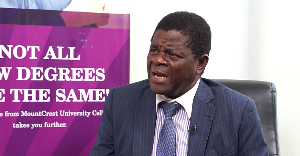AS PART of the government’s efforts, through the Ministry of Fisheries and Aquaculture Development and the Fisheries Commission, to replenish the country’s depleting fish stock, fishermen are expected to observe closed season between May 15 and June 15, 2019.
This was after the move was suspended in 2018 to allow the fisher folks to prepare themselves adequately for its observation this year.
The date was fixed after a stakeholder’s consultative meeting convened by the Ministry of Fisheries and Aquaculture Development to discuss the road map for the implementation of the ‘Closed Season’ concept in Ghana’s fishing industry.
The engagement also discussed the sustainable management and development of the fisheries sector and brought together key stakeholders in the fishing industry including Traditional Chiefs, Chief Fishermen, Fishers, Metropolitan Municipal District Chief Executives, and Ministers of State.
In an address at the NAFAG Hall, Tema Fishing Harbour, the Minister of Fisheries and Aquaculture Development, Madam Elizabeth Afoley Quaye, indicated that the fisheries industry contributed significantly to the national economy of Ghana “employing directly and along its value chain, an estimated 10 per cent of the country’s population.”
Madam Quaye informed that Ghana was among the high consumers of fish globally accounting for close to 25kg of fish per person annually which represented twice the world average of 13kg per person annually with the artisanal sector contributing 70 per cent of domestic fish landings.
On the need to implement the closed season this year based on Ghana’s high dependence on the fishing industry, the Minister said, “Let us all arise and say no to illegal, unregulated and unreported fishing and implement the closed seasons.”
She informed that the sustainable management of the fisheries resources could be successful if it was co-managed by the Traditional Chiefs, Chief Fishermen, all fishers, Members of Parliament, District Assemblies and local media, “Because you are closer to the fishermen than the staff of the Fisheries Commission who happen to be few.”
The Executive Director of the Fisheries Commission, Mr Michael Arthur-Dadzie, in a welcome address informed that the meeting was to deepen the consultation process to ensure the successful implementation of the closed season.
Mr Arthur-Dadzie said after announcing the closed season, there would be deeper consultation at the Regional, District, Community and Landing Beach levels led by the fishers and supported by the Ministry through the Fisheries Commission.
The Executive Director recounted the poor fishing story of the previous year by saying, “We were all witnesses to the low catch recorded by the fishers during 2018 August bumper harvest period and the small-sized fishes they landed.”
He informed that without immediate action by government and key stakeholders in the fisheries sector to intervene, Ghana’s marine fish stocks, particularly the small pelagic, will collapse “and this will mean the collapse of the livelihood of the 10 per cent of the population that depends on the industry.”
Closed season is practiced in many fisheries management jurisdictions as a measure to improve the fishery resources.
It reduces the excessive pressure on fish stocks and allows gravid fish to spawn in the peak season. It would be recalled that the Ministry of Fisheries and Aquaculture Development intended to implement the closed season concept in 2018 but was met with strict resistance from the fishing community which caused the its suspension resulting in a broader consultation towards a possible implementation in 2019.
Business News of Friday, 15 February 2019
Source: dailyheritage.com.gh

















